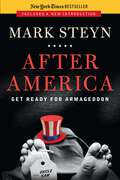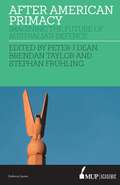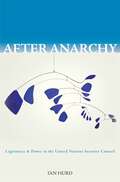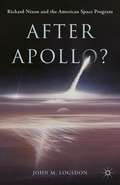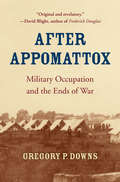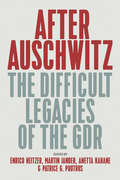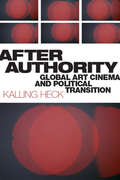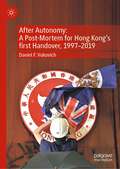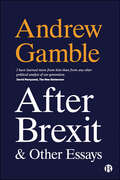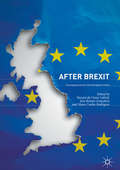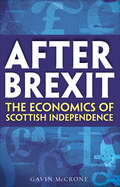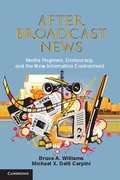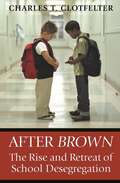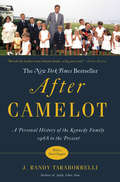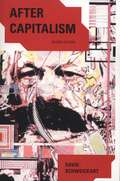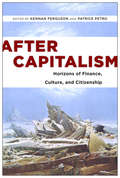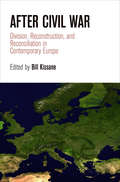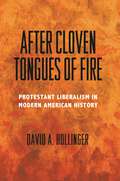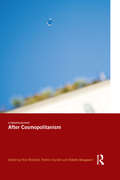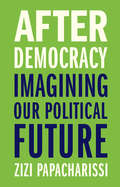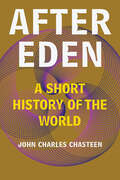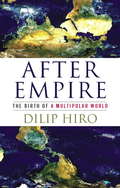- Table View
- List View
After America: Get Ready for Armageddon
by Mark SteynOptimistic About America's Future?Don't Be.In his giant New York Times bestseller, America Alone: The End of the World as We Know It, Mark Steyn predicted collapse for the rest of the Western World. Now, he adds, America has caught up with Europe on the great rush to self-destruction.It's not just our looming financial collapse; it's not just a culture that seems on a fast track to perdition, full of hapless, indulgent, childish people who think government has the answer for every problem; it's not just America's potential eclipse as a world power because of the drunken sailor policymaking in Washington--no, it's all this and more that spells one word for America: Armageddon.What will a world without American leadership look like? It won't be pretty--not for you and not for your children. America's decline won't be gradual, like an aging Europe sipping espresso at a café until extinction (and the odd Greek or Islamist riot). No, America's decline will be a wrenching affair marked by violence and possibly secession.With his trademark wit, Steyn delivers the depressing news with raw and unblinking honesty--but also with the touch of vaudeville stand-up and soft shoe that makes him the most entertaining, yet profound, columnist on the planet. And as an immigrant with nowhere else to go, he offers his own prescription for winning America back from the feckless and arrogant liberal establishment that has done its level best to suffocate the world's last best hope in a miasma of debt, decay, and debility. You will not read a more important--or more alarming, or even funnier--book all year than After America.
After American Primacy: Imagining the Future of Australia's Defence
by Peter J. Dean Stephan Frühling Brendan TaylorFor over seventy years the 'Lucky Country's strategic position had been anchored by the US-led international order that has been in place since the ending of the Second World War. But that order is now under strain due to a confluence of forces, including US President Donald Trump's 'America first' policies, increasingly assertive authoritarian regimes in China and Russia, and the rise of new powers - such as India and Indonesia - as more powerful international players. In this new era, beset with rapid strategic and technological change underpinned by increasing major power jostling in a more multipolar Indo-Pacific, what does the future hold for this region and for Australia's defence policy? Like its companion volumes, Australia's Defence: Towards a New Era? (2014) and Australia's American Alliance (2016), this book brings together leading experts to examine the future of Australian defence policy after American primacy, plotting possible, probable and preferable strategic futures for a country that faces unprecedented strategic challenges.
After Anarchy: Legitimacy and Power in the United Nations Security Council
by Ian HurdThe politics of legitimacy is central to international relations. When states perceive an international organization as legitimate, they defer to it, associate themselves with it, and invoke its symbols. Examining the United Nations Security Council, Ian Hurd demonstrates how legitimacy is created, used, and contested in international relations. The Council's authority depends on its legitimacy, and therefore its legitimation and delegitimation are of the highest importance to states. Through an examination of the politics of the Security Council, including the Iraq invasion and the negotiating history of the United Nations Charter, Hurd shows that when states use the Council's legitimacy for their own purposes, they reaffirm its stature and find themselves contributing to its authority. Case studies of the Libyan sanctions, peacekeeping efforts, and the symbolic politics of the Council demonstrate how the legitimacy of the Council shapes world politics and how legitimated authority can be transferred from states to international organizations. With authority shared between states and other institutions, the interstate system is not a realm of anarchy. Sovereignty is distributed among institutions that have power because they are perceived as legitimate. This book's innovative approach to international organizations and international relations theory lends new insight into interactions between sovereign states and the United Nations, and between legitimacy and the exercise of power in international relations.
After Apollo?
by John M. LogsdonOnce the United States landed on the moon in July 1969, it was up to President Nixon to decide what to do in space after Apollo. This book chronicles the decisions he made, including ending space exploration and approving the space shuttle. Those decisions determined the character of the US human space flight program for the next forty years.
After Appomattox: Military Occupation and the Ends of War
by Gregory P. DownsThe Civil War did not end with Confederate capitulation in 1865. A second phase commenced which lasted until 1871--not Reconstruction but genuine belligerency whose mission was to crush slavery and create civil and political rights for freed people. But as Gregory Downs shows, military occupation posed its own dilemmas, including near-anarchy.
After Auschwitz: The Difficult Legacies of the GDR
by Enrico Heitzer, Martin Jander, Anetta Kahane Patrice G. PoutrusFrom the moment of its inception, the East German state sought to cast itself as a clean break from the horrors of National Socialism. Nonetheless, the precipitous rise of xenophobic, far-right parties across the present-day German East is only the latest evidence that the GDR’s legacy cannot be understood in isolation from the Nazi era nor the political upheavals of today. This provocative collection reflects on the heretofore ignored or repressed aspects of German mainstream society—including right-wing extremism, anti-Semitism and racism—to call for an ambitious renewal of historical research and political education to place East Germany in its proper historical context.
After Auschwitz: The Difficult Legacies of the GDR
by Enrico Heitzer, Martin Jander, Anetta Kahane Patrice G. PoutrusFrom the moment of its inception, the East German state sought to cast itself as a clean break from the horrors of National Socialism. Nonetheless, the precipitous rise of xenophobic, far-right parties across the present-day German East is only the latest evidence that the GDR’s legacy cannot be understood in isolation from the Nazi era nor the political upheavals of today. This provocative collection reflects on the heretofore ignored or repressed aspects of German mainstream society—including right-wing extremism, anti-Semitism and racism—to call for an ambitious renewal of historical research and political education to place East Germany in its proper historical context.
After Authoritarianism: Transitional Justice and Democratic Stability (Political Economy of Institutions and Decisions)
by Monika NalepaTransitional justice – the act of reckoning with a former authoritarian regime after it has ceased to exist – has direct implications for democratic processes. Mechanisms of transitional justice have the power to influence who decides to go into politics, can shape politicians' behavior while in office, and can affect how politicians delegate policy decisions. However, these mechanisms are not all alike: some, known as transparency mechanisms, uncover authoritarian collaborators who did their work in secret while others, known as purges, fire open collaborators of the old regime. After Authoritarianism analyzes this distinction in order to uncover the contrasting effects these mechanisms have on sustaining and shaping the qualities of democratic processes. Using a highly disaggregated global transitional justice dataset, the book shows that mechanisms of transitional justice are far from being the epilogue of an outgoing authoritarian regime, and instead represent the crucial first chapter in a country's democratic story.
After Authority: Global Art Cinema and Political Transition
by Kalling HeckAfter Authority explores the tendency in art cinema to respond to political transition by turning to ambiguity, a system that ideally stems the reemergence of authoritarian logics in art and elsewhere. By comparing films from Italy, Hungary, South Korea, and the United States, this book contends that the aesthetic tradition of ambiguity in art cinema can be traced to post-authoritarian conditions and that it is in the context of a transition away from authoritarianism where art cinema aesthetics become legible. Art cinema, then, can be seen as a mode of cinematic practice that is at its core political, as its constitutive ambiguity finds its roots in the rejection of centralized and hierarchical configurations of authority. Ultimately, After Authority proposes a history of art cinema predicated on the potentials, possibilities, and politics of ambiguity.
After Autonomy: A Post-Mortem for Hong Kong’s first Handover, 1997–2019
by Daniel F. VukovichThis book offers a sharp, critical analysis of the rise and fall of the 2019 anti-extradition bill movement in Hong Kong, including prior events like Occupy Central and the Mongkok Fishball Revolution, as well as their aftermaths in light of the re-assertion of mainland sovereignty over the SAR. Reading the conflict against the grain of those who would romanticize it or simply condemn it in nationalistic fashion, Vukovich goes beyond mediatized discourse to disentangle its roots in the Basic Law system as well as in the colonial and insufficiently post-colonial contexts and dynamics of Hong Kong. He examines the question of localist identity and its discontents, the problems of nativism, violence, and liberalism, the impossibility of autonomy, and what forms a genuine de-colonization can and might yet take in the city. A concluding chapter examines Hong Kong’s need for state capacity and proper, livelihood development, in the light of the Omicron wave of the Covid pandemic, as the SAR goes forward into a second handover era.
After Brexit and Other Essays
by Andrew Gamble‘Being more like America again and less like Europe is the heart of the UK model of capitalism … [but] there are many respects in which Britain remains unlike America despite its strong appeal to the British political class ...’ In 'After Brexit' Andrew Gamble sets out the economic models and external relationships that Britain has pursued since the Second World War and examines the choices it now faces as it adjusts to life outside of the European Union. This volume brings together this essay with some of Andrew Gamble’s most important and influential writings on British politics and political economy from the last forty years. They reflect on many of the issues that animate British politics, from the relative decline of the economy and the reshaping of the welfare state to the transformation of the Conservative and Labour parties and the changing constitutional order with the devolution of power to Wales, Scotland and Northern Ireland. The volume is introduced by the author and includes his notes on each of the essays as well as an epilogue, which considers their original context and what has changed since. Taken together, the essays in this volume are testament to the acuity of one of Britain’s foremost political thinkers and provide rich insight into debates and ideas that continue to influence British politics and Britain’s place in the world. A companion volume of Andrew Gamble’s essays, The Western Ideology and Other Essays, focusing on political ideas and ideologies, is also available from Bristol University Press.
After Brexit: Consequences for the European Union
by Nazaré da Costa Cabral José Renato Gonçalves Nuno Cunha RodriguesThis topical and important book identifies the short to medium-term economic, financial and social consequences of Brexit. Containing perspectives from leading thinkers across legal, economic and financial fields, it considers both the general effect of UK withdrawal on the European integration process, and the specific impact on the free movement of capital, goods and people. <P><P> Addressing the main areas within both the UK and the EU that can and will be affected by Brexit, including the financial sector, immigration, social rights and social security, After Brexit: Consequences for the European Union will make fascinating reading for all those currently engaged in the study and practice of Law, Economics, Finance, Political Science, Philosophy, History and International Affairs.
After Brexit: The Economics of Scottish Independence
by Gavin McCronePressure for independence remains a major force in Scotland, but the case for it has changed substantially since the referendum of 2014. In the 2016 Brexit referendum, 60 per cent of the Scottish electorate voted to remain part of the European Union– the only part of the UK to reject Brexit so unequivocally. This new analysis takes into account a host of economic issues including deficit, debt, currency, energy (including North Sea oil and gas), pensions, mortgages and the financial sector. It weighs up the advantages of rejoining the EU single market, either as a full EU member or as a member of the EEA, with the disadvantages of a hard border with the rest of the UK. Independence would create opportunities, but it would also bring many thorny problems which the Scottish government, and the Scottish people, would have to face.
After Broadcast News
by Michael X. Delli Carpini Bruce A. WilliamsThe new media environment has challenged the role of professional journalists as the primary source of politically relevant information. After Broadcast News puts this challenge into historical context, arguing that it is the latest of several critical moments, driven by economic, political, cultural and technological changes, in which the relationship among citizens, political elites and the media has been contested. Out of these past moments, distinct 'media regimes' eventually emerged, each with its own seemingly natural rules and norms, and each the result of political struggle with clear winners and losers. The media regime in place for the latter half of the twentieth century has been dismantled, but a new regime has yet to emerge. Assuring this regime is a democratic one requires serious consideration of what was most beneficial and most problematic about past regimes and what is potentially most beneficial and most problematic about today's new information environment.
After Brown: The Rise and Retreat of School Desegregation
by Charles T. ClotfelterThe United States Supreme Court's 1954 landmark decision, Brown v. Board of Education, set into motion a process of desegregation that would eventually transform American public schools. This book provides a comprehensive and up-to-date assessment of how Brown's most visible effect--contact between students of different racial groups--has changed over the fifty years since the decision. Using both published and unpublished data on school enrollments from across the country, Charles Clotfelter uses measures of interracial contact, racial isolation, and segregation to chronicle the changes. He goes beyond previous studies by drawing on heretofore unanalyzed enrollment data covering the first decade after Brown, calculating segregation for metropolitan areas rather than just school districts, accounting for private schools, presenting recent information on segregation within schools, and measuring segregation in college enrollment. Two main conclusions emerge. First, interracial contact in American schools and colleges increased markedly over the period, with the most dramatic changes occurring in the previously segregated South. Second, despite this change, four main factors prevented even larger increases: white reluctance to accept racially mixed schools, the multiplicity of options for avoiding such schools, the willingness of local officials to accommodate the wishes of reluctant whites, and the eventual loss of will on the part of those who had been the strongest protagonists in the push for desegregation. Thus decreases in segregation within districts were partially offset by growing disparities between districts and by selected increases in private school enrollment.
After Camelot: A Personal History of the Kennedy Family--1968 to the Present
by J. Randy TaraborrelliFor more than half a century, Americans have been captivated by the Kennedys - their joy and heartbreak, tragedy and triumph, the dark side and the remarkable achievements. In this ambitious and sweeping account, Taraborelli continues the family chronicle begun with his bestselling Jackie, Ethel, Joan and provides a behind-the-scenes look at the years "after Camelot." He describes the challenges Bobby's children faced as they grew into adulthood; Eunice and Sargent Shriver's remarkable philanthropic work; the emotional turmoil Jackie faced after JFK's murder and the complexities of her eventual marriage to Aristotle Onassis; the the sudden death of JFK JR; and the stoicism and grace of his sister Caroline. He also brings into clear focus the complex and intriguing story of Edward "Teddy" and shows how he influenced the sensibilities of the next generation and challenged them to uphold the Kennedy name. Based on extensive research, including hundreds of exclusive interviews, After Camelot captures the wealth, glamour, and fortitude for which the Kennedys are so well known. With this book, J. Randy Taraborrelli takes readers on an epic journey as he unfolds the ongoing saga of the nation's most famous-and controversial-family.
After Capital (Published in association with Theory, Culture & Society)
by Couze VennThe present crisis of capitalism has a history. A history of the private accumulation of wealth through property regimes which allow increasing commodification and the privatisation of resources: from land to knowledge and even to life itself. Understanding that history may allow us to imagine alternatives after Capital which are no longer private but common. After Capital explores this history, showing how the economy is linked to environmental damage, climate change, resource depletion, and to massive inequality. It takes the reader from liberalism to neoliberalism, from climate change to the Anthropocene, and shows how this history is inextricably the history of colonialism. It is a rich and detailed narrative of capitalism over the last 200 years, that explains its texture and its neoliberal endgame. This discussion frames speculation on what postcapitalist societies could be, with regimes of private accumulation replaced by a politics and ethics of a democratic and ecologically- grounded Commons.
After Capitalism
by David SchweickartSince first published in 2002, After Capitalism has offered students and political activists alike a coherent vision of a viable and desirable alternative to capitalism. David Schweickart calls this system Economic Democracy, a successor-system to capitalism which preserves the efficiency strengths of a market economy while extending democracy to the workplace and to the structures of investment finance. In the second edition, Schweickart recognizes that increased globalization of companies has created greater than ever interdependent economies and the debate about the desirability of entrepreneurship is escalating. The new edition includes a new preface, completely updated data, reorganized chapters, and new sections on the economic instability of capitalism, the current economic crisis, and China. Drawing on both theoretical and empirical research, Schweickart shows how and why this model is efficient, dynamic, and applicable in the world today.
After Capitalism: Horizons of Finance, Culture, and Citizenship
by Andrew Ross A. Aneesh Geoff Mann Marcus Bullock Jeffrey Sommers Sherryl Vint Bernard C. Perley Cristina Venegas Esther Leslie Kennan Ferguson Niki Akhavan Patrice Petro Ivan AscherFrom Thomas Piketty to David Harvey, scholars are increasingly questioning whether we are entering into a post-capitalist era. If so, does this new epoch signal the failure of capitalism and emergence of alternative systems? Or does it mark the ultimate triumph of capitalism as it evolves into an unstoppable entity that takes new forms as it engulfs its opposition? After Capitalism brings together leading scholars from across the academy to offer competing perspectives on capitalism's past incarnations, present conditions, and possible futures. Some contributors reassess classic theorizations of capitalism in light of recent trends, including real estate bubbles, debt relief protests, and the rise of a global creditocracy. Others examine Marx's writings, unemployment, hoarding, "capitalist realism," and coyote (trickster) capitalism, among many other topics. Media and design trends locate the key ideologies of the current economic moment, with authors considering everything from the austerity aesthetics of reality TV to the seductive smoothness of liquid crystal. Even as it draws momentous conclusions about global economic phenomena, After Capitalism also pays close attention to locales as varied as Cuba, India, and Latvia, examining the very different ways that economic conditions have affected the relationship between the state and its citizens. Collectively, these essays raise provocative questions about how we should imagine capitalism in the twenty-first century. Will capitalism, like all economic systems, come to an end, or does there exist in history or elsewhere a hidden world that is already post-capitalist, offering alternative possibilities for thought and action?
After Civil War: Division, Reconstruction, and Reconciliation in Contemporary Europe (National and Ethnic Conflict in the 21st Century)
by Bill KissaneCivil war inevitably causes shifts in state boundaries, demographics, systems of rule, and the bases of legitimate authority—many of the markers of national identity. Yet a shared sense of nationhood is as important to political reconciliation as the reconstruction of state institutions and economic security. After Civil War compares reconstruction projects in Bosnia, Cyprus, Finland, Greece, Kosovo, Northern Ireland, the Republic of Ireland, Spain, and Turkey in order to explore how former combatants and their supporters learn to coexist as one nation in the aftermath of ethnopolitical or ideological violence.After Civil War synthesizes research on civil wars, reconstruction, and nationalism to show how national identity is reconstructed over time in different cultural and socioeconomic contexts, in strong nation-states as well as those with a high level of international intervention. Chapters written by anthropologists, historians, political scientists, and sociologists examine the relationships between reconstruction and reconciliation, the development of new party systems after war, and how globalization affects the processes of peacebuilding. After Civil War thus provides a comprehensive, comparative perspective to a wide span of recent political history, showing postconflict articulations of national identity can emerge in the long run within conducive institutional contexts.Contributors: Risto Alapuro, Vesna Bojicic-Dzelilovic, Chares Demetriou, James Hughes, Joost Jongerden, Bill Kissane, Denisa Kostovicova, Michael Richards, Ruth Seifert, Riki van Boeschoten.
After Cloven Tongues of Fire: Protestant Liberalism in Modern American History
by David A. HollingerThe important role of liberal ecumenical Protestantism in American historyThe role of liberalized, ecumenical Protestantism in American history has too often been obscured by the more flamboyant and orthodox versions of the faith that oppose evolution, embrace narrow conceptions of family values, and continue to insist that the United States should be understood as a Christian nation. In this book, one of our preeminent scholars of American intellectual history examines how liberal Protestant thinkers struggled to embrace modernity, even at the cost of yielding much of the symbolic capital of Christianity to more conservative, evangelical communities of faith.If religion is not simply a private concern, but a potential basis for public policy and a national culture, does this mean that religious ideas can be subject to the same kind of robust public debate normally given to ideas about race, gender, and the economy? Or is there something special about religious ideas that invites a suspension of critical discussion? These essays, collected here for the first time, demonstrate that the critical discussion of religious ideas has been central to the process by which Protestantism has been liberalized throughout the history of the United States, and shed light on the complex relationship between religion and politics in contemporary American life.After Cloven Tongues of Fire brings together in one volume David Hollinger's most influential writings on ecumenical Protestantism. The book features an informative general introduction as well as concise introductions to each essay.
After Cosmopolitanism
by Rosi Braidotti Bolette Blaagaard Patrick HanafinAt a time when social and political reality seems to move away from the practice of cosmopolitanism, whilst being in serious need of a new international framework to regulate global interaction, what are the new definitions and practices of cosmopolitanism? Including contributions from leading figures across the humanities and social sciences, After Cosmopolitanism takes up this question as its central challenge. Its core argument is the idea that our globalised condition forms the heart of contemporary cosmopolitan claims, which do not refer to a transcendental ideal, but are rather immanent to the material conditions of global interdependence. But to what extent do emerging definitions of cosmopolitanism contribute to new representative democratic models of governance? The present volume argues that a radical transformation of cosmopolitanism is already ongoing and that more effort is needed to take stock of transformations which are both necessary and possible. To this end, After Cosmopolitanism calls for an understanding of cosmopolitanism that is more attentive to the material reality of our social and political situation and less focused on linguistic analyses of its metaphorical implications. It is the call for a cosmopolitanism that is also a cosmopolitics.
After Democracy: Imagining Our Political Future
by Zizi PapacharissiWhat do ordinary citizens really want from their governments? Democracy has long been considered an ideal state of governance. What if it&’s not? Perhaps it is not the end goal but, rather, a transition stage to something better. Drawing on original interviews conducted with citizens of more than thirty countries, Zizi Papacharissi explores what democracy is, what it means to be a citizen, and what can be done to enhance governance. As she probes the ways governments can better serve their citizens and evolve in positive ways, Papacharissi gives a voice to everyday people, whose ideas and experiences of capitalism, media, and education can help shape future governing practices. This book expands on the well-known difficulties of realizing the intimacy of democracy in a global world—the &“democratic paradox&”—and presents a concrete vision of how communications technologies can be harnessed to implement representative equality, information equality, and civic literacy.
After Eden: A Short History of the World
by John Charles ChasteenTo solve the problems of the twenty-first century, historian John Charles Chasteen argues that we must first know our shared human story. In After Eden, prominent Latin American historian John Chasteen presents a concise down-to-earth, fast-paced narrative of world history, from the Big Bang to the present, animated by stories of people from all walks of life and enriched by insightful analysis and the author’s extensive world travel. To tackle today’s major problems of global inequality and environmental degradation, Chasteen argues that we must first understand our shared past, both the violent and cruel dimensions—“humanity’s inhumanity to itself”—and the aspirational ones—the creation of universal religions and ethical systems; the birth of the ideas of individual liberty and freedom; the resistance to the excesses of global capitalism; the civil rights and decolonization movements; and the environmental and social justice movements of today. For Chasteen, ultimate success hinges on our ability to recognize from our past experiences what is needed for us to live cooperatively and, most critically, the ways we educate our young people.
After Empire: The Birth of a Multipolar World
by Dilip HiroAmerican corporations have to beg for capital from the cash-rich Sovereign Wealth Funds in the Persian Gulf. By invading Iraq, President George W. Bush grossly undermined American credibility in the international arena and irrevocably weakened Washington’s diplomatic clout. Together, these historic shifts have provided an opportunity for the world to move from the tutelage of the sole superpower, America, to a multi-polar global order, one where America’s moral, economic, and military leadership will be profoundly challenged. What form will this world resemble? What are the perils and promises of this new power order? InAfter Empire, Dilip Hiro provides a realistic, challenging, and nuanced look at the emerging power politics of the coming century and considers how they are going to turn our world upside-down.
